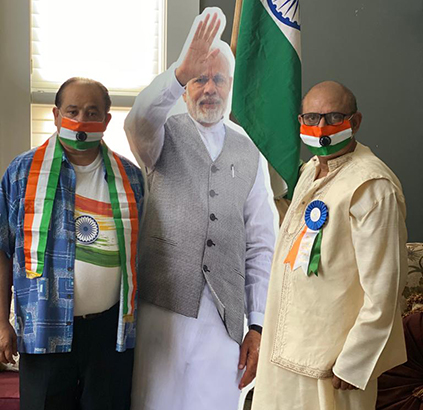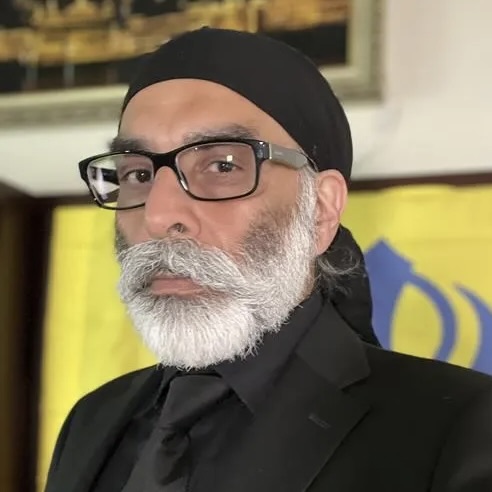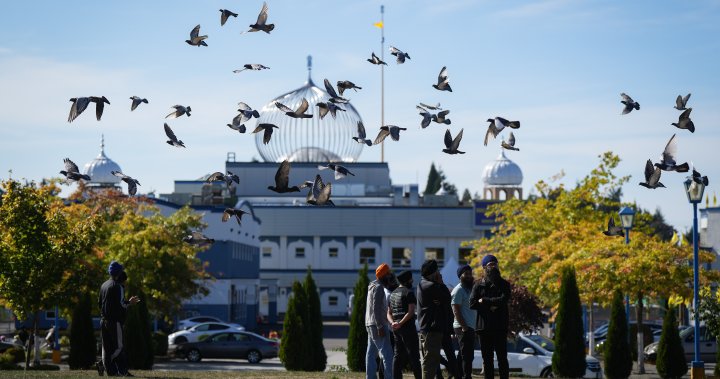
Five years before Canadian Sikh leader Hardeep Singh Nijjar was gunned down in the parking lot of his Surrey, B.C., temple, India sent the RCMP an urgent request.
A bombing was about to occur in India, the notice said.
To stop the attack, the RCMP needed to arrest Nijjar immediately, the Indian authorities explained.
Acting on the information, the RCMP took Nijjar into custody, but it was quickly apparent India did not have reliable evidence to back its allegations.
The Mounties released Nijjar without any charges, but the 2018 incident was a red flag for Canada, according to a source familiar with the matter who described what happened on the condition of not being identified.
Although New Dehli had branded Nijjar a terrorist, alleging he was a B.C.-based leader of an armed separatist group responsible for attacks in India, proof was lacking, the source said.
As India repeatedly pressed Canada for his arrest over the years that followed, the RCMP grew increasingly concerned about the policing and human rights practices behind the allegations.
To address the problems, senior RCMP officials met with India’s National Investigation Agency in November 2021 to discuss issues such as the evidentiary requirements of Canada’s legal system.
But India allegedly opted for a different strategy.
Protesters at the Consulate General of India in Vancouver following shooting of Hardeep Singh Nijjar, pictured on the sign, June 24, 2023.
THE CANADIAN PRESS/Ethan Cairns
On the evening of Sunday, June 18, 2023, Nijjar was leaving Surrey’s Guru Nanak Sikh Temple, where he was president, when two gunmen opened fire on his pickup truck.
Prime Minister Justin Trudeau claimed in September that investigators were “pursuing credible allegations” Indian government agents were involved, setting off a diplomatic spat that saw Ottawa and New Delhi expel each others’ envoys.
Trudeau has provided no details to back his accusations, India has denied involvement, and the Indian press has depicted the shooting as part of a local gang war.
But on Friday, the RCMP arrested the three suspected hitmen accused of carrying out the killing.
Canadian investigators believe the slaying was an escalation of the Indian government’s campaign against Sikh separatists, and that its foreign intelligence agency, the Research and Analysis Wing, was likely behind it, the source said.
Hardeep Singh Nijjar, who was gunned down on June 18, 2023.
For almost a decade, India tried and failed to convince Canada to arrest Nijjar, alleging he was recruiting youths, funding weapons purchases, and masterminding attacks in India.
The Indian authorities filed extradition papers, issued Interpol warrants, offered a reward, and even claimed Nijjar was planning a “major terrorist attack.”
Except for the brief 2018 arrest, Canada never acted on the requests due to concerns about standards of the Indian police, with one official calling them “incompetent.”
Canadian officials now suspect the killing was India’s response: if Ottawa wouldn’t stop separatist figures like Nijjar, Indian agents would do it themselves.
India has long complained that Canada was a base for the fight for Khalistan, the homeland sought by some members of the Sikh faith.
As Indian forces crushed an uprising by separatists fighting for independence for the Sikh-majority Punjab, some moved to Canada and continued the struggle.
In 1985, B.C.-based members of the pro-Khalistan militant group Babar Khalsa International carried out the deadliest terrorist attack in Canada’s history. Luggage bombs checked onto two Air India planes at Canadian airports killed 331 people, most of them Canadian citizens.
Natasha Madon at the Air India Memorial in Vancouver’s Stanley Park on July 27, 2007. Her father, Sam Madon, was aboard Air India Flight 182 when a bomb exploded on board. (CP PHOTO/Richard Lam).
Violence continued in 1986, when members of the International Sikh Youth Federation, a Babbar Khalsa affiliate, shot an Indian cabinet minister in B.C.
“Over time, the Khalistan movement ebbed,” Tanya Mehra and Colin Clarke wrote in an International Centre for Counter-Terrorism paper.
But it has undergone a “revival in recent years, mainly among the Sikh diaspora,” they wrote, “and to a limited extent within India itself.”
Still, it has not posed a significant security threat since the early 1990s, said Dan Stanton, former executive operations manager at the Canadian Security Intelligence Service.
As support for Khalistan took root in countries like the United Kingdom and Canada, the Indian government treated it as an external threat to its stability and national security.
“They approach these activists the way they might have approached bona fide Sikh extremists 30 years ago, which is not distinguishing between their right to freely express these political ideals, and conflating that all with terrorism,” Stanton said.
Doing so may be a political calculation, in which the government conflates the threat in order to project an image of strength, said Stanton, who worked on the Khalistan issue while at CSIS.
“You create a threat external to India, and you go out and defeat it, and then you do well in elections.”
Given concerns over the treatment of religious minorities under the leadership of Prime Minister Narendra Modi, the targeting of Sikhs in Canada may make perverse sense, he added.
“That’s really what repressive regimes do. They don’t want people in the expatriate communities to be badmouthing their regime, and they take action on it.”
The Indian campaign against Nijjar began in earnest in 2016, when New Delhi alleged he had taken over as the operational leader of the Khalistan Tiger Force militant group.
India alleged that in December 2015, he had organized a weapons training camp on a rural property in Mission Hills, B.C., and asked Canada to extradite him.
The RCMP investigated the site and found nothing, and Nijjar responded by releasing a letter he wrote to Trudeau calling the allegations “fabricated,” and complaining that India was maligning him because of his pro-Khalistan activism.
A Surrey plumber, Nijjar had been promoting the Khalistan cause since becoming a Canadian permanent resident, which involved court battles against the government.
A Canadian citizen, Hardeep Singh Nijjar travelled to promote Khalistan.
Nijjar had arrived in Toronto in 1997, using a fraudulent Indian passport that identified him as “Ravi Sharma,” documents obtained by Global News show.
In his refugee claim, he wrote that he feared persecution in India because he belonged to “a particular social group, namely, individuals associated with Sikh militants.”
While he said Indian police had arrested and tortured him for information about militants, immigration officials did not believe him and rejected his refugee claim in 1998.
Days later, he married a B.C. woman who sponsored him to immigrate, but officials concluded it was a marriage of convenience and turned him down.
For reasons that remain unclear, Nijjar was still able to immigrate, and he soon began travelling to promote the cause of Khalistan independence.
India began to push back after he appeared before the U.N. Human Rights Council in Geneva and U.N. headquarters in New York.
India’s Central Bureau of Investigation claimed captured militants had implicated him in a 2007 bombing and issued an Interpol warrant for his arrest in 2014.
Regardless, Canada granted him citizenship on March 3, 2015. Another Interpol notice followed in 2016, but Canada took no action.
Credible allegations of torture
In May 2016, another B.C. plumber travelled to India and was promptly arrested. Indian police accused him of attending the training camp they claimed Nijjar had organized.
A permanent resident of Canada, the man acknowledged knowing Nijjar, since both lived in Surrey and were in the same profession, but he denied any role in terrorism.
While he was fighting the allegations in India, his Canadian permanent residence expired. To get it back, he appealed to Canada’s Immigration and Refugee Board, records show.
A woman reads bulletin board outside Guru Nanak temple, Surrey, B.C.
Global News
In a decision obtained by Global News, which does not name him, the IRB wrote that the Indian courts had found “not a single shred of evidence” linking him to terrorism.
“All of the evidence before me indicates that his treatment by the Indian authorities has been a great injustice,” IRB Member Craig Costantino wrote.
“He credibly testified that he was tortured through numerous means including electrocution of his genitals,” the IRB added in its ruling.
“Despite this torture and detention of over seven months, he was eventually released on minimal bail conditions with the court finding that there was no evidence to support the allegations against him.”
Four years after his arrest, India had not even scheduled a trial, Costantino wrote, adding “the Indian authorities have treated the appellant in an unjust and unconscionable way, that violates not only Canadian legal principles but international legal norms.”
The Canadian government restored his permanent residence in 2022, allowing him to return to B.C., but his lawyer said India has prevented him from leaving.
For Canada, the case was yet another reason for caution about the Indian authorities and their pursuit of Nijjar and those around him.
In February 2018, Canada and India shook hands on an agreement to cooperate against terrorism.
The deal came during Trudeau’s state visit to India — a tour that went off the rails over a guest invited to a reception at the Canadian high commissioner’s residence.
B.C. resident Jaspal Atwal had been convicted in 1987 over the attempted assassination of an Indian cabinet minister visiting Vancouver Island.
His inclusion on the Canadian guest list, at the invitation of a Liberal MP, helped drive India’s portrayal of Trudeau as soft on pro-Khalistan extremism.
The Guru Nanak Sikh Gurdwara in Surrey, B.C., Sept. 18, 2023, where temple president Hardeep Singh Nijjar was gunned down. THE CANADIAN PRESS/Darryl Dyck.
Canadian officials subsequently placed two men, Bhagat Singh Brar of Brampton, Ont., and Surrey, B.C., resident Parvkar Singh Dulai, on the no-fly list.
Canadian national security officials alleged both were terrorism facilitators in the Khalistan movement. They denied the allegations and have appealed to the courts.
Still, India remained focused on Nijjar’s extradition, and in April 2018, issued a report claiming he was “planning to carry out a major terrorist attack in India.”
“He intends to execute the attack at a time and place where there is a large gathering so that there are maximum casualties,” India’s National Investigation Agency alleged in a report published online.
India placed Nijjar on its list of “designated terrorists” in 2020.
But Canadian security agencies and police would have taken such information “with a grain of salt,” Stanton said.
A “close examination” would be needed to verify its veracity, or whether it was the result of coercion, financial incentives or vindictiveness, the former CSIS official said.
“You just can’t take it on a face value,” he said. “You’re dealing with agencies that work in a world where they may just fire off a message and say, this person’s a criminal, this person’s a terrorist, and then that’s it.”
“But the Canadian system is different. We have due process, we have democratic institutions, and we can’t just take a foreign state’s word for it, especially if it involves someone’s, freedom and potentially someone’s life.”
According to Stanton, that Canada never acted on India’s requests to arrest Nijjar suggests “they didn’t really have much substance.”
“Probably because he was an activist.”
On Feb. 17, 2023, India outlawed the Khalistan Tiger Force, the group it claimed Nijjar led, claiming it “promotes various acts of terrorism, including targeted killings in Punjab.”
The following month, a major police operation began in the Punjab. Amritpal Singh Sandhu, a popular Khalistan activist, had escaped from custody.
A day after the manhunt got underway, the Friends of Canada and India Foundation was scheduled to host Indian High Commissioner Sanjay Verma, in Surrey.
Protesters turned up outside the venue, the Taj Park Convention Centre, to voice their support for Sandhu, and the event was cancelled.
“Our guests were attacked by Khalistani goons,” Maninder Gill, president of the Friends of Canada and India Foundation, wrote in a letter to the RCMP commissioner.

Maninder Gill, left, heads the Friends of Canada and India Foundation.
He said “there were multiple instances of assault, pushing, uttering threats, flogging and manhandling. Even media persons were not spared.”
During the protest, Khalistan movement leaders, including Nijjar, made what Gill called “inflammatory speeches.”
“The RCMP was a mute spectator to this open daylight violence,” he complained, adding police had “remarked that protestors were exercising their ‘right to protest.’”
This was not the way to improve relations with India, he said. “My life and limb is in danger from Khalistani radicals every time I walk out of my house.”
Canada was “worse than Afghanistan,” the Indian Express newspaper quoted Gill saying, as police turned a blind eye to the “Khalistani mob.”
Protests against the hunt for Sandhu continued six days later outside the Indian consulate in Vancouver, prompting India to express its “strong concerns.”
“The ongoing search for Sandhu is creating a wave of unrest and protests,” Canada’s Integrated Terrorism Assessment Centre wrote in a report, classified Secret.
Indian diplomats protested again in early June, this time over a float at a parade in Brampton, Ont., that glorified the 1984 assassination of India’s then-prime minister Indira Gandhi by her Sikh body guards.
“India’s external affairs minister commented on the float, saying ‘it is not good for relationships, not good for Canada,’” according to another ITAC threat report obtained by Global News.
A familiar narrative was emerging: Canada was failing to confront pro-Khalistan violence.
By this time, Nijjar was growing concerned about his safety, said Gurpatwant Singh Pannun, a Khalistan activist based in the U.S. and head of the group Sikhs for Justice.
Gang members had warned Nijjar that Indian intelligence agents had placed a bounty on both their heads, Pannun said in an interview last year.
This map released by RCMP shows route taken by the gunmen who shot Hardeep Singh Nijjar on June 18, 2023.
RCMP
Canadian Security Intelligence Service officers had also told Nijjar that “professional assassins” were after him, Pannun said.
CSIS may have been acting on information shared by the FBI, which had infiltrated a similar plot in the U.S.
According to the FBI, Indian intelligence had recruited a businessman named Nikhil Gupta to kill Pannun, offering money and the dismissal of charges against him.
Gupta, in turn, allegedly hired organized crime to conduct the shooting. But the FBI had an undercover agent inside the conspiracy, and he had heard talk about a killing planned in Canada.
Two days before Nijjar was scheduled to meet the CSIS officers about the threats, he was shot dead at his temple.
The night of Nijjar’s killing, Indian intelligence sent Gupta a video of the Canadian’s body, the FBI said. Nijjar was “also the target,” Gupta allegedly told the undercover.
“We have so many targets.”
With Nijjar dead, Pannun was a “priority now,” an Indian intelligence official told Gupta on June 20. Gupta was arrested 10 days later in the Czech Republic.

The U.S. linked a plot to kill pro-Khalistan activist Gurpatwant Singh Pannun to the Indian government. THE CANADIAN PRESS.
Unlike Canada, the U.S. avoided pointing fingers at Modi’s government, apparently prioritizing diplomatic relations amid growing unease with China.
India has reportedly told the U.S. the plot against Pannun was directed by rogue officials in RAW who acted without government authority.
While Canadian officials believe Indian national security agents directed Nijjar’s assassination, India continues to deny any involvement.
“If the allegations of the involvement of Indian state agents in the killing of Nijjar are true, India has clearly crossed a line,” Mehra and Clarke wrote in their paper.
By committing an assassination in Canada, India had “joined an ever-growing list of countries that resort to the unlawful use of force and targeted killings.”







